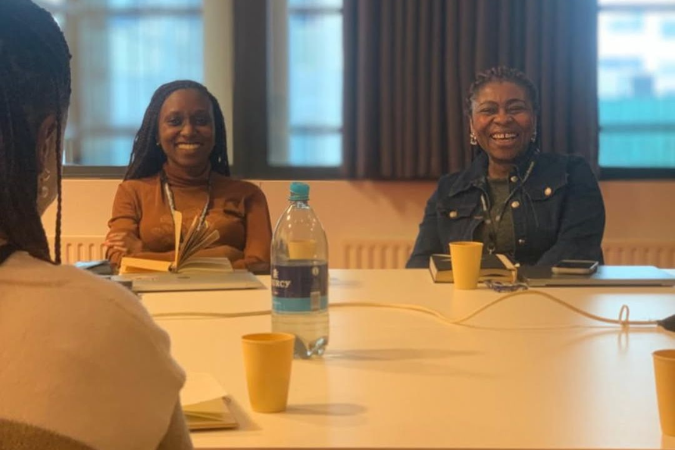There’s no shortage of producer labs promising mentorship, funding access, and global exposure. From the Sundance Institute to the Realness Institute’s Creative Producer Indaba (CPI), these programs are increasingly seen as the launchpad for emerging African talent.
But after the pitch decks are polished, the virtual workshops are wrapped, and the flights home are taken, what’s the actual return on investment?
This month, we reflect on the purpose and power of producer labs through the lens of Juliana Kabua’s recent participation in CPI, as she wraps up months of mentorship, workshops, and international exposure.
Do these programs build better producers or just busier ones?
Why We’re Asking This Now
Producer development labs are becoming a key part of the African filmmaking journey. More and more emerging creatives are being encouraged to apply and rightly so. They offer access to decision-makers, pitch forums, and global collaborators.
Juliana Kabua, producer of the upcoming feature Stero, was recently selected for the Creative Producer Indaba, a 7-month program that includes labs at the Marrakech International Film Festival and IFFR in Rotterdam.
As she closes this chapter, we wanted to explore:
What do these labs really offer? Are they moving the needle for African filmmakers or just moving us from one application deadline to the next?
Access to the Room vs. Power in the Room
Many labs promise proximity to global funders and producers. But proximity doesn’t always translate to power. African creatives may get to present their projects but are they influencing how those projects are shaped, funded, or distributed?
As Juliana Kabua points out, African filmmakers often find themselves adapting to systems that weren’t built with them in mind. While proximity to power is often framed as a win, true empowerment comes from building systems that reflect our own realities and aspirations.
Programs like CPI are beginning to challenge these dominant models, encouraging filmmakers to rethink how success is defined and how power can be reclaimed.
Development Isn’t a Destination
There’s a growing concern that African stories are becoming stuck in "development hell" endlessly refined for labs, but rarely financed for production. Labs are helpful, but when does the actual making begin?
Lab Burnout is Real
Between constant applications, pitch preparations, unpaid workshop hours, and the pressure to perform, the lab grind can take a toll. Is there enough emotional and financial support built into these systems?
But When They Work, They Work
We’ve also seen the magic: partnerships formed, films greenlit, and confidence gained. For Juliana and many others, the exposure and mentorship from CPI opened real doors.
In her words:
"CPI gave me space to reset and expand how I think about producing on the continent. I walked in with a project, but left with a much broader view on sustainability, systems building, and what it means to build something long-term. CPI doesn’t just focus on the project; it focuses on the holistic growth of the producer."
She adds:
"It also encouraged deep introspection about what kind of producer I want to be. While there were no perfect answers, the mentors helped us find new language and vision for the work we want to do. More importantly, it created a community. We can’t build alone."
What’s the Alternative? (Or the Next Step?)
If labs are here to stay, how do we make them better?
- What would a Pan-African lab, designed by and for African producers, look like?
- How do we move from lab “prestige” to real pipeline building?
- How can local networks, mentorship circles, and regional funds complement international labs?
Juliana also shared a refreshing insight from CPI’s approach to pitching:
Participants were encouraged to realize their own "locus of power" whether that meant unique IP, deep community ties, or original storytelling authority and to lead negotiations from a position of strength.
It’s not just about being heard; it’s about knowing where your leverage lies, and using it to shape better deals and more sustainable careers.
As Juliana reflected in our conversation:
"We need to define what works for us as Africans and build our own systems for a future that allows us to harness resources within the continent. Otherwise, we stay stuck selling IP externally for small payouts, and starting the cycle all over again."
Juliana Kabua’s Top 3 Takeaways from CPI
1. Find and own your voice as a producer.
Not just project by project but as a coherent body of work.
2. Sustainable systems matter.
Building production companies that can thrive long-term (not just chasing the next project) is key to African storytelling futures.
3. Community is critical.
We cannot build alone. Labs that foster genuine relationships and peer networks are more valuable than any single masterclass.
Conclusion: So… Do They Work?
Maybe the answer isn’t a simple yes or no.
Some labs lead to career-defining breakthroughs. Others leave filmmakers more burnt out than built up.
But one thing is clear: African producers are not short on vision. What we need are systems that support that vision sustainably systems that don’t just prepare us to pitch, but to produce, own, and lead.
The challenge now is to create more intentional, inclusive spaces where African producers aren't just invited to the table they are building the table themselves.
